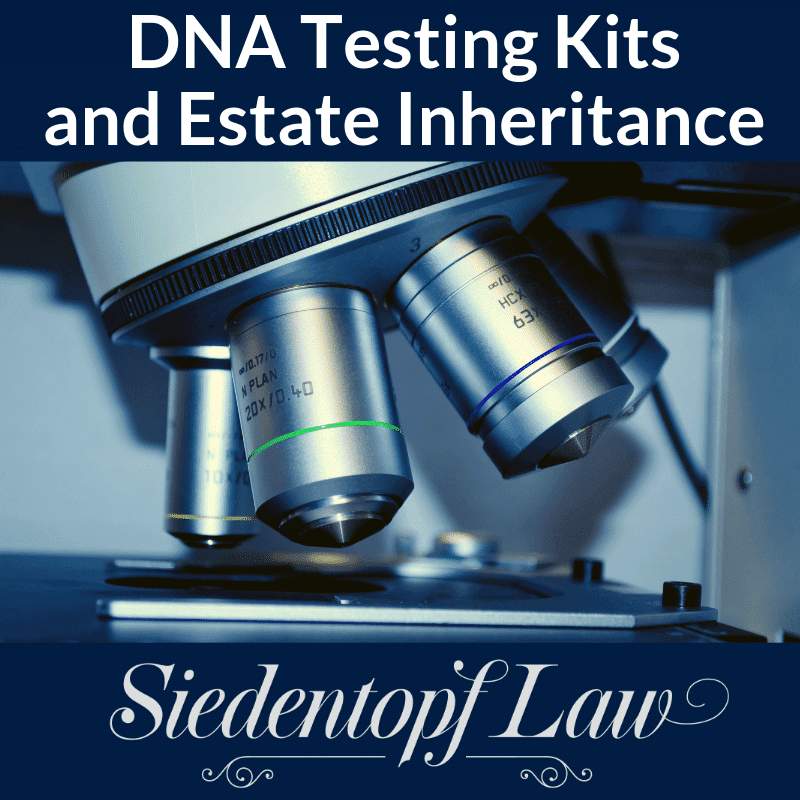As DNA testing kits become more popular and affordable, there is an increased interest in learning about ancestry and familial relationships. DNA testing kits can also be helpful tools in settling estate disputes.
As DNA testing kits become more popular and affordable, and as the Internet strengthens our global connectivity, there is an increased interest in learning about ancestry and familial relationships. At Siedentopf Law, our clients ask about DNA kits as it relates to finding new or lost relatives, or resolving issues related to estate planning and probate.
How DNA Testing Works
DNA (Deoxyribonucleic Acid) is the genetic material within every living organism. We inherit DNA from our parents, with each parent passing along half of their genetic data to their children. Every human has a unique DNA code, which in turn determines their individual characteristics. Testing a person’s DNA helps answer questions about their physical make-up as well as their relationship to other people.
DNA Tests and Ancestry
Many people submit DNA kits in order to determine their ancestry. Companies such as AncestryDNA, 23andMe, and Family Tree DNA offer customers the opportunity to connect with living family members and past relatives. Despite the popularity of these “ancestry” DNA kits, people should be aware that the results may not be as precise or as specific as they hope. Your DNA is a genetic record of thousands of relatives; companies can identify DNA patterns with people living in certain areas today, but the tests are not nuanced enough to determine all of the precise locations in which your ancestors resided. In order to confirm heritage, people should look at their DNA results in addition to documents such as birth records, immigration records, military forms, marriage records, census records, and/or death certificates.
DNA Tests to Locate or Verify Living Relatives
DNA technology enables researchers to answer questions about a variety of familial relationships and personal circumstances. DNA tests can determine paternity, maternity, siblings, grandparents, aunts, uncles, and lineage. In order to complete these tests, the medical researchers need both the DNA of the patient/client as well as the DNA of the family member in question – or that family member’s close relative.
DNA Testing to Resolve Estate Disputes
As DNA testing can help verify paternity, maternity, and other types of familial relationships, these tests can be helpful tools in settling estate disputes. DNA testing can help solve challenges to wills and prove whether someone is a genuine heir. Typically, probate courts will take into account these DNA results and family relationships in determining how an estate will be divided among their heirs and beneficiaries. Also of note, some labs will perform Estate Protection DNA Testing, which is when a person tests and preserves his or her DNA profile for future use – DNA that can be used to verify whether a person is truly related to the individual who created the will or other estate planning document.
As it relates to estate planning, it is a good idea to memorialize your wishes about how your assets will be distributed to your family and other beneficiaries. It is also beneficial to keep your estate planning documents, life insurance policies, accounts and other important documents updated to reflect your family status. If you have additional questions about DNA testing and estate inheritance or want to set up an estate planning consultation, contact Siedentopf Law via our website at EstateLawAtlanta.com or by calling (404) 736 – 6066.
© Sarah Siedentopf and Siedentopf Law, 2019. Unauthorized use and/or duplication of this material without express and written permission from this site’s author and/or owner is strictly prohibited. Excerpts and links may be used, provided that full and clear credit is given to Siedentopf Law and EstateLawAtlanta.com with appropriate and specific direction to the original content.








